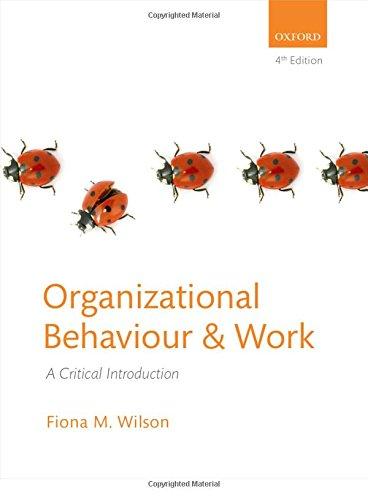It is in the interest of organizations to try to manage the perceptions that people have of
Question:
It is in the interest of organizations to try to manage the perceptions that people have of them as employers. Goldman Sachs and Pfizer are companies that appear to be trying to change perceptions of themselves as firms in which women are welcomed. Goldman Sachs is a global banking firm with 20,000 employees worldwide, In forty-seven offices across twenty-five countries; in Europe, it employs 5,000 staff. It believes that recruiting a diverse workforce will aid all levels of its business—but finds that women are not drawn to its business because of preconceived ideas of roles in investment banking (including ‘pounding the City floor’, ‘a 24-hour job’). As a result, Goldman Sachs started Its ‘A-Level Girls’ programme In 2000. This initiative is supported by senior managing directors and has to report into the European Union Diversity Committee on a regular basis.
Annabel Smith, executive director for global leadership and diversity at Goldman Sachs, informs us that the company has developed a relationship with sixty state and public schools, within which it targets female A level students. The girls are Invited to attend a two-day event at which they look at the variety of roles in a global banking business and undertake activities relating to these roles. For example, to illustrate sales and trading, the firm gave the students Destiny’s Child tickets and asked to see for what they could sell or trade them. The firm proactively retains these relationships with the girls throughout university, with the aim of asking them to attend a summer school once they have graduated. It has also developed a half-day conference for teachers, which includes lesson plans on how to write a CV and other job-related skills.
Goldman Sachs maintains its relationships with young women and the schools through diversity networks of its existing staff. Staff participation in this network is recognized in staff annual reviews.
Pfizer is a pharmaceutical company. It wanted to focus on taking the stress out of the return to work-particularly for women returning after maternity leave. At the time of writing, less than half (44 per cent) of its staff are female and the company aims to retain its female talent.
Pfizer already has In place the following initiatives:
• 148 on-site childcare places;
• childcare services;
• holiday clubs;
• mentoring;
• a Daphne Jackson Fellowship for returnees;
• flexible working (for which the company feels there Is a strong business case);
• a phased return programme;
• various networks (including women’s, carers’ support, rainbow, further education, and French).
The company has recently developed a new initiative called ‘Freetime’, which is to address the practical problems that people face on their return to work (for example, new IT systems, or new policies or practices). This Initiative was developed by a senior manager and is therefore said to have full senior management support.
Freetime consists of packs developed for the individual, the manager, and colleagues, and addresses three situations: a maternity break; a career break; and long-term sick leave. The manager’s pack looks at issues around communication, including demonstrating a considerate manner, and developing a reintroduction programme for returnees. In the case of maternity leave, the pack also considers the three key times for a woman: prior to going on leave; during leave; and on her return. The colleague pack has a checklist of new information to pass on to the returning colleague, and Includes weekly and monthly updates and checklists.
Pfizer has found that the earlier the intervention, the more seamless the transition to returning to work, beoause it makes the employee feel valued by her manager and the company. Research has shown that women are more likely not to return to work after their second child, so the company believes that if it makes the first experience as supportive as possible, It Is more likely to retain the woman’s talent In the company.
Questions
1. What evidence is there that these companies have been successful in their mission to recruit more female employees?
2. What would you do in these circumstances?
3. What would you do to recruit those from ethnic minority backgrounds?
Step by Step Answer:

Organizational Behaviour And Work A Critical Introduction
ISBN: 9780199645985
4th Edition
Authors: Fiona M. Wilson





